|
 |
|
夏札法王
移喜泰賢金剛上師
啤嗎哈尊金剛上師
HH
Chatral Rinpoche Vajra
Master Yeshe Thaye
Vajra Master Pema_Lhadren |
敦珠佛學會
Dudjom Buddhist Association
文章精選
Selected Articles
|


 |
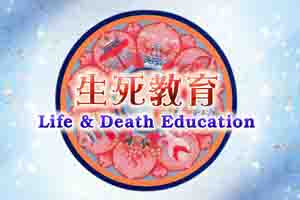 |
Life & Death Education
Series
|
 |
 |
 |
Life & Death
Education
|
|
   |
|

 |
|

 |
|

 |
|
 |
|
現代生死科學資訊集
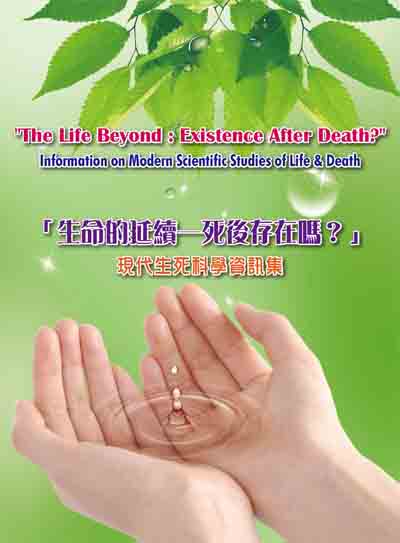
現時坊間廣泛被討論及湧現千萬個個案的「瀕死體驗」例證,都很清楚地向人類啟示了一個重點,就是「生命會在死後繼續存在」,以至「死後世界」與「重獲生命的投胎」,都確實是存在的,而且曾經有人類經歷過。
而最重要的訊息是,人類的「意識」,並未因死亡而消失,而是不斷的繼續存在着。這種「意識」的繼續存在,也代表「生命」的仍然存在,只是存在的方式及形態不同了,存在的環境不同了,感受也不同了。
由於「死亡」已經不再是以往人類的認知那樣,死後就甚麼也沒有,而是超越想像的充滿變數及危險。以往的「死亡」,死者及其親友只需要應付「離別的傷痛、失去一切、病的痛苦、怕被人遺忘」等等問題,隨著大量湧現的「瀕死體驗」例證、科學及醫學界的精英參與研究、符合科學鑑證條件的證據出現等等,都令大眾對認識「死亡」及「死亡的過程」之廣度及深度增大了很多。
為了進一步提供一個能夠協助大眾,尋找及探究有關「現代生死科學」的不同平台,本會特別搜集了這些平台的資料,並結集成為此一本「資訊集」,免費提供各界人士參考之用。




|
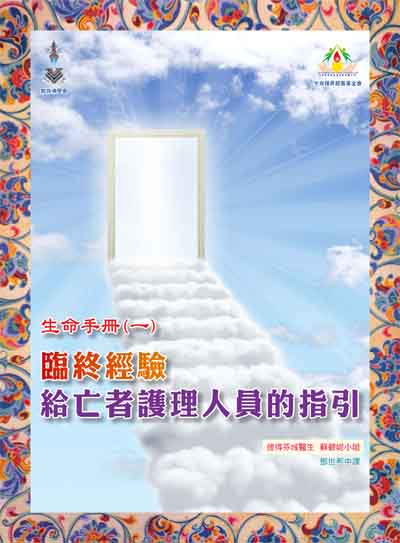
療養院的護理人員和善終服務人士常說,他們感到一個人在生命最後數周或數天,面對引起存活的議題、或有關死亡和臨近死亡這類困難問題時,如何應對顯得準備不足。
我們希望這本指引對你在「臨終關顧」方面能提供支持,並幫助你對死亡過程有更深入的了解。
但這本指引並非企圖專斷、預測或決定死亡應是如何,亦非希望把臨終作任何浪漫化。
再者,不少臨近命終者對死亡的恐懼至難以思辨,或者拒絕承認他們的生命己近尾聲。
因此,尊重個人需要基本上是必要的,並且警惕將個人對死亡及臨終的信仰強加諸他人的危險。
然而,死亡過程可從異於平日的某些行為或言語判別。
學習認識這些事情能幫助護理人員及臨終者在步向死亡時有所舒緩。
 


|
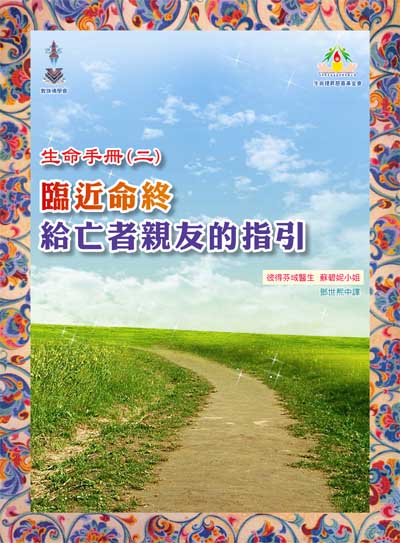
我們希望在您關切的挚愛臨近死亡的困難時刻時,這本小册子能給您支持和方向。
死亡是激起人情緒的題目,在現代的文化,我們很少有直接或個人體驗。因此,我們往往漠視或恐懼死亡或步向死亡。我們寧可逃避,却不願接受死亡為我們生命經驗中的一部份。
這指引是累積我們研究「臨終經驗」所得,觀察在死亡過程中「身體、情緒和靈性」方面的演變,和作為親屬或朋友,對您可能造成的衝擊,尤其是假若你之前從未有接觸瀕死人士的經驗。(文中靈性是指有關尋找意義、目標和希望)
我們需如何應對死亡,乃視乎我們與亡者關係的性質。例如,我們對兒童的死亡,反應與對長者親人的死亡會頗不同。
一位挚友的死亡對我們的影響或會大於一位近親。 對父母其中一位的死亡或會比另一位顯得更傷慟。
當知道何所預期,可減輕您們將目睹或體會死亡的任何畏懼,當您身邊的人臨近生命終結時,幫助您擔當正面和支持者的角色。
 


|
彼得.芬域醫生
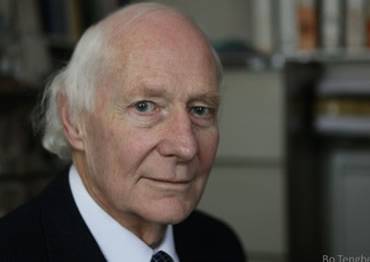
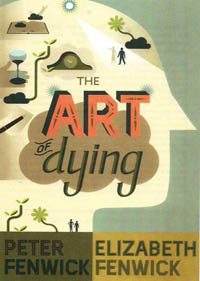
彼得.芬域醫生
(Dr. Peter Fenwick)
-----
劍橋大學文學士、劍橋大學內外全科醫學士、英國皇家精神科學院榮授院士
芬域醫生之專業領域非常廣泛,包括精神病學、神經精神病學、腦內、外科、頭、腦及脊髓疾病及創傷,睡眠紊亂,尤精於腦癎症。他對腦功能與意識間的關係具有長期及廣泛的研究。
芬域醫生曾任多家醫療及學術機構要職,長期任英國摩斯里醫院神經精神科顧問醫生、並曾為英國牛津威傑夫醫院精神科高級講師及神經精神科顧問醫生、倫敦英皇學院精神科高級講師。
目前他是英國布洛姆醫院神經生理學榮譽臨床顧問醫生、及英國修咸頓大學精神科榮譽高級講師。近十年來,他每年都有數月時間在日本一神經科學實驗室從事腦磁圖的研究。他並在英國、荷蘭及日本等地進行龐大的善終服務計劃。他並為「科學與醫學網絡」的主席及「綜合醫學基金」研究委員會主席。
芬域醫生對「瀕死體驗及死亡過程」有長期的研究,分析個案超過三百宗,別具獨到的心得。他著作等身,已發表於學術刊物的論文逾240篇及另有六本專門著作,在專業界內公認為英國主要的「瀕死體驗臨床研究」權威。
有關演講影片







|

Thousands of cases on near-death experiences (NDE)
have
swarmed up and became a hot topic of public discussion in
recent
times. All of these
scientific materials
have
clearly revealed a significant message to human beings:
“life
continues to exist
after death”,
and that the
“world
of after-death”
and
“reincarnation
in the
re-gaining of a new life”
are
really
existing,
and
that
there are human beings
who have
truly experienced them.
The most significant message is
that a human
“consciousness”
does not
simply
vanish after death,
but
then it will
continue to exist ceaselessly thereafter.
This
kind of
continued existence of
“consciousness”
has implication for
the
continuation of
“life”
after death.
It is only a matter of differences in
the
way and mode of existence,
the
environment of existence,
and
the kind of
sensation.
In this regard,
“death”
is no longer the same as what people used to
think of --
that it would be all null after one
passes away. Instead,
it
is
a
great
change
that is so
full of variables and risks, which is way beyond our imagination.
In the past, the deceased person and his/her relatives would merely
have to
deal with issues such as
“the
grief of departing, loss of belonging, suffering of sickness,
anxiety of being abandoned”,
etc.
With
a great deal of NDE cases
as evidence,
more
experts
from the scientific and medical
fields
have
taken
part in research
studies,
resulting
in
providing more
evidence with scientific verifications. All of these
have increased our knowledge on both the
breadth
and depth
of the phenomena of
“death”
and the “dying process”.
Our
Association has collected various information and relevant data of
different platforms on scientific studies of life and death in order
to provide this Information Booklet on
“Modern Scientific Studies of Life & Death” to the general
public for free distribution.



|
End - of - Life
Experiences:
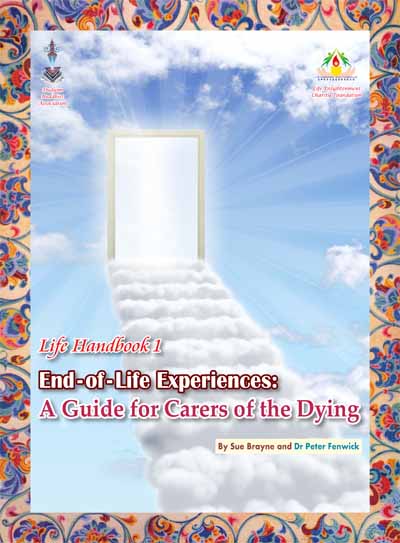
Nursing home carers and hospice workers
often say they feel ill-prepared to deal with existential issues, or
difficult questions about death and dying, that may arise during the
last few weeks and days of a person’s life.
We
hope this guide will provide support for you in end-of-life care, as
well as helping you gain a better understanding of the dying
process. What it’s not intended to do is dictate, predict or
determine how death ‘should be’, not does it wish to romanticise the
end of life in any way.
In
addition, many of the dying find death
frightening to contemplate, and may deny that their life is
drawing to a close.
So,
it is essential to respect the person’s
individual needs, and be aware
of the danger of imposing on them
your own beliefs about death and dying.
Nevertheless, the dying process may be recognised by certain
behaviour and language which differ from the ordinary.
Learning to recognise these things can help both the carer and the
dying to ease the passage towards death.



|
Nearing The End of Life:
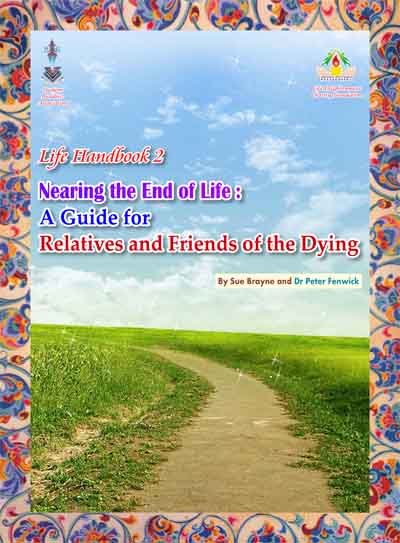
We
hope this booklet
will provide
support and direction for you during the difficult times when
someone you love and care for is dying.
Death is an emotive subject. In our modern culture most of us have
little direct or personal experience of it. As a result, we can
often be ignorant or afraid of death and dying.
Rather than accepting it as part of our life
experience, we can find ourselves running away.
This
Guide – which draws on our research into end-of-life experiences –
looks at the physical, emotional and spiritual progression of the
dying process, and the impact this can have on you as relatives and
friends, especially if you have never been with a dying person
before. (Spirituality, within this context,
is concerned with the search for meaning, purpose and hope).
How
we respond to death depends on the nature of our relationship to the
dying person. For instance, we will react quite differently to the
death of a child than to the death of an elderly relative. We may be
affected by the death of a close friend more than a close relative.
We may grieve more acutely over the death of one parent than the
other.
Knowing what to expect can lessen any dread of what you may see and
experience, and can help you to play a
positive and supporting role when someone close to you
approaches the end of their life.



|
Dr. Peter Fenwick


Dr. Peter
Fenwick
Dr. Peter Fenwick, BA (Cantab), MBBChir (Cantab),
FRCPsych, Senior Lecturer at the Institute of Psychiatry,
University of Southampton, UK. He is also the Chairman of the
Scientific and Medical Network, as well as the Chairman of the
Research Committee, Integral Medical Foundation.
Dr. Fenwick has longstanding research experiences
in the areas of "near-death experiences and the dying process".
He has published over 240 academic papers and 6 books of special
topics, and is considered as the major authority in clinical
research on "Near-Death Experiences" (NDEs) in the United
Kingdom.
The following are
some of the video clips of
Dr. Peter Fenwick:






 |
|

|








